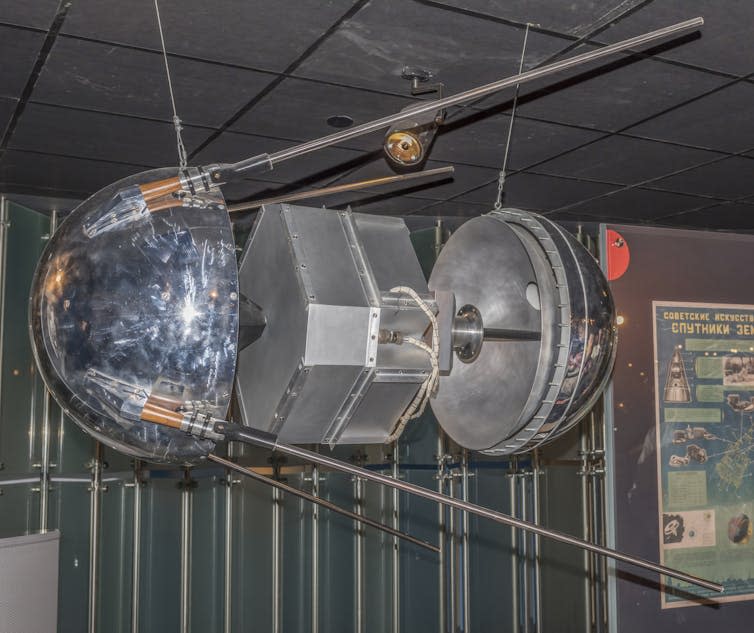As conflict rages on Earth, an arms race could be taking place in outer space. On May 30, a US diplomat warned that Russia had launched a “weapon into orbit”, which Russia’s deputy foreign minister, Sergey Ryabkov, branded “fake news”. It follows on from allegations in recent months by US and Russian officials that both countries are seeking to put nuclear weapons into space.
Such action, if true, would violate the UN’s 1967 Outer Space Treaty, under which all parties agreed “not to place in Earth orbit any objects carrying nuclear weapons or any other form of weapons of mass destruction”. The treaty has now been ratified by 114 countries, including leading space powers such as the US, Russia, China, India, France, Japan and the UK.
The news of possible nuclear weapons in space is worrying, especially at a time when the race to land and settle humans and exploit resources on the Moon, Mars and beyond has get bigger Many fear that the potential weaponization of space is eroding the freedom to explore and peacefully use outer space.
Not only would a space weapon be dangerous to world peace, it also threatens to hinder technological development on Earth. If the arms race in space escalates into an all-out war, it could lead to the use of weapons that can destroy valuable assets such as satellites. This would affect our communication, navigation and other innovations.
The United Nations Security Council has become a battleground for how to control the rhetoric of space weapons and warfare. The security council is made up of 15 countries, including five veto-wielding members, and is responsible for maintaining international peace and security.
In response to reports that Russia had developed an anti-satellite nuclear weapon to put into space, the US and Japan put forward a draft resolution in April 2024 calling on all countries to prevent an arms race in outer space. Russia vetoed the resolution, but said it was “firmly committed” to the current 1967 treaty. The veto prompted the United States to question whether Moscow was hiding something.
Then, in May 2024, Russia and China drafted a similar resolution that emphasized the need to prevent “the appearance, threat or use of any weapon in outer space”. This resolution received seven votes in favor and seven votes against. Therefore, he failed to pass.
Army space
Military interests, assets and personnel have always been at the forefront of exploring and using outer space. Indeed, the fear that the first satellites and humans to orbit the Earth could give the Soviet Union a military and strategic advantage prompted the US to consider space as an extension of the arms race during the cold war.
After a series of nuclear tests in outer space in the 1960s by both the US and the Soviet Union, a mutual understanding of their destructiveness and threat to the Earth’s atmosphere created the subsequent Outer Space Treaty. But, while the Treaty prohibits weapons of mass destruction exclusively in outer space, it leaves room for ambiguity regarding other types of weapons.
As a result, the US and the Soviet Union tested a number of anti-satellite weapons during and after the cold war. China and India have also conducted missile tests against space satellites, and the United Kingdom, France, Israel, Japan, North and South Korea, and Iran are believed to be capable of developing anti-satellite weapons .
Only in 2022 did the US become the first country to announce a ban on such missile tests, saying they were reckless. The tests create space debris, which endangers active satellites and people in orbit.

The weaponization of space poses a significant threat to the inclusiveness and shared benefits of exploring and using outer space. Low-Earth orbit is becoming increasingly crowded, with an astronomical increase in the number of satellites launched by both established and emerging space nations.
According to United Nations records, over 80 countries have put nearly 18,450 objects into orbit since 1957. And no less than 15 African countries have orbited 58 satellites in the last three decades, with 100 satellites at various stages of production on the continent. These are significant investments driven by the desire for some level of independence in access to space for socio-economic development and security.
It’s not just countries that share the benefits of space. The private sector is increasingly involved in space activities. Elon Musk’s SpaceX, for example, launched 6,500 Starlink satellites, of which 6,050 were still in orbit as of May 2024. This initiative aims to provide high-speed internet connections to remote and disconnected areas around the world.
That said, the collaboration between SpaceX’s Starlink and the US Department of Defense, which supports the actions of the Ukrainian army in its conflict with Russia, makes them a potential target in the event of a Russian nuclear attack in space.
The threat of an arms race in space must be realized and faced. Renewed cooperation among the world’s major powers and support for the UN framework are critical to guaranteeing the peaceful and inclusive exploration and use of outer space.
This article from The Conversation is republished under a Creative Commons license. Read the original article.


The authors do not work for, consult with, or own shares in, or receive funding from, any company or organization that would benefit from this article, and have disclosed no relevant affiliations beyond their academic appointment.